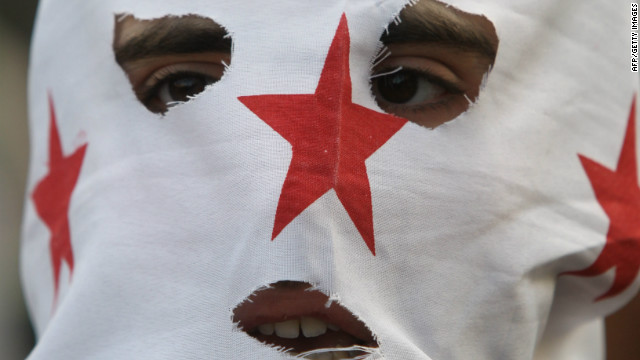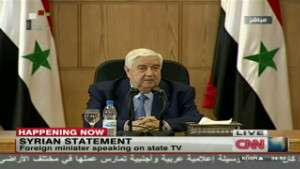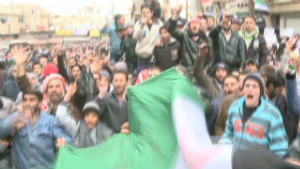
- NEW: ElBaradei approached for envoy role in Syria
- NEW: 60 people were killed in Syria Tuesday, opposition group says
- Syria's foreign minister says Russia, Iran support his country
- Bloc of Gulf Arab nations withdraw observers from Arab League mission
Damascus, Syria (CNN) -- Syria has extended the Arab League monitors' mission for a month, foreign ministry spokesman Jihad Makdessi told CNN Tuesday.
This comes after the league voted Sunday to extend the mission. Syrian media quoted the foreign ministry as saying the mission will last until February 22. Foreign Minister Walid Moallem sent a letter to Arab League Secretary-General Nabil el-Araby notifying him of Syria's agreement to the extension.
But the mission took a hit when it lost a chunk of its manpower Tuesday.
CNN's Nic Robertson on covering Syria
The six nations from the Gulf Cooperation Council withdrew its observers because of the persistence of bloodshed in Syria and the government's "lack of commitment" to adhere fully to the plan it agreed to with the Arab League.
The bloc includes Saudi Arabia, Kuwait, the United Arab Emirates, Qatar, Bahrain and Oman. Saudi Arabia decided to pull out its monitors Sunday, and the other countries in the bloc followed Tuesday.
Ahmed Marai, an Arab League official in Cairo, told CNN that 55 monitors from Gulf Cooperation Council countries have been withdrawn from the mission. The council called on other Arab countries to put pressure on Syria so it will implement Arab League decisions.

 Syria's FM speaks out on the Arab League
Syria's FM speaks out on the Arab League 
 Syria rejects power transfer plan
Syria rejects power transfer plan It is also calling for the five permanent members of the U.N. Security Council -- the United States, France, Britain, Russia and China -- and other council members to ratchet up pressure on the regime. It wants the Security Council to support the Arab League's Syrian initiative by passing a resolution.
The Gulf Cooperation Council has a lot of pull in the region. It brokered a presidential transition plan in Yemen and sent troops to Bahrain during the unrest there.
The 22-member Arab League has called on Syrian President Bashar al-Assad's regime to stop violence against civilians, free political detainees, remove tanks and weapons from cities, and allow outsiders -- including the international news media -- to travel freely in Syria.
There are close to 100 monitors at present. Anwar Malek, a former Arab League monitor from Algeria who has criticized the mission, said he expected more monitors to withdraw after he slammed the effort earlier this month. He said snipers targeted his car after he spoke out.
"Not a single monitor I met was happy or felt safe on the ground," Malek said.
The league is working on a proposal for al-Assad to transfer power to his vice president following the formation of a national unity government.
The group's plan calls for the government to start talks with the opposition within two weeks and for the formation of a new government within two months. A new constitutional council would follow, as would a plan for parliamentary and presidential elections.
The proposal is the clearest statement yet from the Arab League on what the league's member states would like to see happen in Syria. The league plans to take the idea to the United Nations in a bid to build international support.
El-Araby and Qatari Prime Minister Sheikh Jasem Al Hamad sent a letter to the United Nations Tuesday requesting a meeting with Secretary-General Ban Ki-moon on the league's proposed national unity government for Syria, according to an Arab League official. The official asked not to be named because he is not authorized to speak with the media.
The league does not want military intervention in tackling the crisis but is requesting the support of the U.N. Security Council for its initiative, the official said.
Ban and el-Araby spoke by phone Monday and Ban "reiterated the readiness of the United Nations to provide technical support in the form of training for observers," said U.N. spokesman Martin Nesirky.
El-Araby has offered Egyptian reform leader Mohamed ElBaradei a role as a special political envoy to Syria, ElBaradei's media officer said. ElBaradei, a Nobel laureate and former head of the International Atomic Energy Agency, has not accepted or refused.
Susan Rice, the U.S. ambassador to the United Nations, said the situation in Syria "continues to deteriorate dramatically" and the Security Council "should fully support the Arab League's efforts to broker an end to the bloodshed and a peaceful transition to democracy in Syria."
"Despite the presence of Arab League monitors, the (al-Assad) regime is ignoring its commitments to the Arab League plan, including by failing to end all acts of violence and to protect Syrian civilians. Scores of civilians are killed every day. Thousands of political detainees remain incarcerated across the country, many at serious risk of torture. As a result of the regime's failure to fulfill the requirements of the Arab League plan, there are more and more calls from the region for Security Council involvement," she said.
The uprising against the regime and the resulting government crackdown have engulfed the country for more than 10 months. The United Nations last month estimated that more than 5,000 people have died since March. Opposition groups are estimating a higher death toll. The Local Coordination Committees of Syria said Tuesday more than 6,600 deaths have been documented since the unrest began. Avaaz, a political activist group, says it has exceeded 7,000.
At least 60 people were killed Tuesday in Syria, the LCC said. Forty-one died in Homs -- 18 of them when two buildings were shelled in the city's Bab Tadmur neighborhood. The other deaths occurred in Hama, Idlib, Raqqa, Daraa, Douma and Damascus, the group said.
The Syrian government has categorically rejected the Arab League plan for the transfer of power.
Moallem said the league report "violates the sovereignty of Syria." He said the observer mission report, which showed that Syria fulfilled the mission's protocol, was replaced with a "political report."
Speaking to reporters at a press conference in Damascus, Moallem said his country needed "a Syrian solution driven by Syrian interests," which would be based on achieving al-Assad's reform plan.
Moallem also repeated his government's contention that the Syrian uprising is driven by a "conspiracy." He said some Arab entities are "implanting the stages of the plot against Syria which they agreed upon abroad."
"We are perfectly aware of the dimension of the conspiracy and we will deal with it firmly," the foreign minister said, adding that "it is the duty of the Syrian government to deal seriously and firmly with armed elements."
Syria blames the bloodshed on armed terrorists, and Moallem said the number of armed groups has sharply increased since the mission's arrival December 26.
Moallem also noted that Iran has been a solid and supportive ally and that sanctions imposed on Syria have exacerbated the economic crisis and caused suffering.
Russia will also "not agree on the foreign interference in Syria's internal affairs and this is a red line," Moallem said about the key member of the U.N. Security Council. "During talks with Russian Deputy Foreign Minister Michael Bugdanov, I sensed that the Russian stance is solid and no one can question the Russian-Syrian relations as they are deep-rooted."
Journalist Mohamed Fadel Fahmy and CNN's Hamdi Alkhshali, Joe Sterling, Nada Husseini and Yousuf Basil contributed to this report.

No comments:
Post a Comment